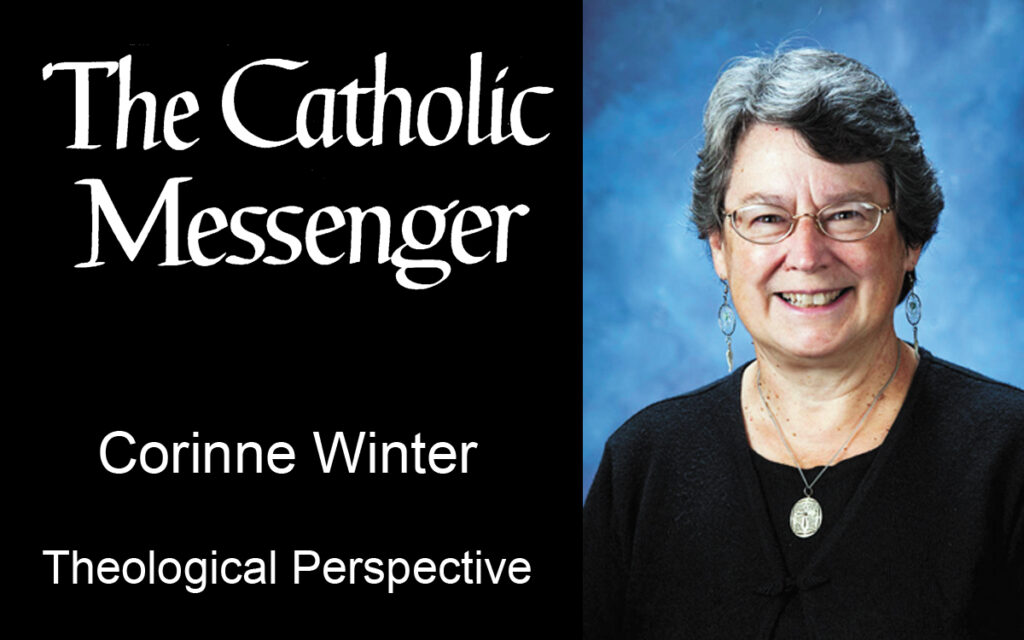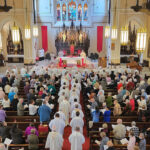By Corinne Winter
After the assertion we reviewed last month, that the Son shares the divinity of the Father, both the Apostles’ and the Nicene Creeds turn to the Incarnation. The Son of God, by the power of the Holy Spirit, was born of the Virgin Mary. The divine Son became fully human, truly taking flesh of Mary. Indeed, the declaration of the Council of Chalcedon (451 C.E.) includes the same term for Christ’s relationship with us as it does for his relationship with the Father. Christ is “consubstantial” with the Father as to his divinity and with us as to his humanity. Being fully human, he endured even suffering and death, drawing every aspect of human experience into the very life of God.
 The doctrine of the Incarnation lies at the heart of Christian faith. As such, it should never cease to astonish us, and never stop engaging us in reflection and prayer. The truth is immense and cannot be reflected adequately in volumes let alone in a few words. The following are only a few of the ideas that strike me as especially important for today.
The doctrine of the Incarnation lies at the heart of Christian faith. As such, it should never cease to astonish us, and never stop engaging us in reflection and prayer. The truth is immense and cannot be reflected adequately in volumes let alone in a few words. The following are only a few of the ideas that strike me as especially important for today.
The Nicene Creed includes the reminder that the Incarnation, life, death and resurrection are “for our salvation.” How do we understand the salvation for which we hope? How is it related to life in the present? We are challenged as we read the Scripture not to think simply of a heaven “out there,” away from our current experience, but to see God at work here and now, to be transformed by the saving message. Moreover, we need to integrate the point that God chooses a people; salvation is not just about a “personal savior,” although a personal relationship with God is important.
What is the significance of Jesus’ being born of Mary? We recognize the virgin birth as an extraordinary divine gift. At the same time, Augustine tells us that we should see in Mary’s role a sign of our own calling. We, too, must be open to the Spirit who will work through us to bring Christ to others and others to Christ.
In the Incarnation, the divine Son takes on a created nature and enters into the world. His work thus calls us to find God here where we are rather than thinking of the spiritual realm as something outside of everyday life.
Looking at the list of what Christ did, we may be puzzled at the jump from birth to death. What about the life and teaching of Jesus? The doctrines included in the creeds remind us how we should read and hear the accounts of Jesus’ work and teaching: as God’s saving Word.
What does it mean for us that Christ suffered and died? We know that we are saved through Jesus’ sacrifice. Many works of Christian devotion call us to give thanks for the cross and/or to let the image of Christ on the cross call us to repent for our sins. The Gospels tell us that we are also called to take up the cross, to bear our own burdens and to share those of others. We are called to have the courage of Christ to stand up for truth and justice.
Many Christians today also reflect on Christ’s death as a witness against unjust systems. On a political level, Jesus was tortured and killed wrongly, a victim of unjust political and social structures. Such structures certainly exist today. They include racism, poverty, unfair distribution of wealth and power, abortion, lack of health care, and so many more. To kneel before the cross is to repent for social as well as for individual sin. Taking up the cross includes speaking and acting out according to our abilities.
Raised from the dead, Jesus Christ, fully human and fully divine, is revealed as Lord and Savior. We cannot grasp the exact nature of the resurrection, but as Christians we hold to the belief that Christ was raised bodily and was seen by his disciples. In that faith, we share the joy of the disciples and, with them, we become eager to share the good news. We pray to be filled with the Spirit in order to know what we should do and to do it whole-heartedly.
By his resurrection and ascension to the Father, Christ reveals our own final destiny. We are called as whole persons to the fullness of life. Our bodies and, indeed, all of creation share in that calling. Bodies are not simply clothing or instruments that will eventually be set aside for eternity. That is why the church admonishes us to treat our own and others’ bodies and all of creation with reverence.
The next articles on the creeds will urge us to believe in the Spirit at work among us that we may follow the call of Christ toward communion with God.
(Corinne Winter is a professor-emerita of St. Ambrose University, Davenport.)











